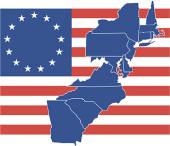‘Murica or Democracy Moves Fourth

Even though I spent most of my holiday working around the house, I guess I need to take a moment to acknowledge just why I got an extra day off work. Maybe I don’t embrace it quite as strongly as a lot of people because I studied the foundation of the United States of America quite extensively in school. And I think there are a lot of misconceptions about this important day in history that I’d like to try to clear up.
The majority of the Founding Fathers were rich landowners who had a lot of time to sit and think and be influenced by the Neo Renaissance. They’d been growing angry that they had a thriving economy of manufacturing goods, but in order to really, officially buy anything, they had to ship it across the Atlantic and then buy it when it got shipped back. That kind of thing is expensive. On top of that, the colonists had just about no say in anything when it came to governance. These men also knew that if they acted without the support of their fellow transplanted Europeans, it’d be a hanging for sure.
What most people now don’t seem to realize is that the colonies already thought of themselves as a “United States of America” even before the Declaration was drafted. With leagues and leagues separating them from their official governing body, they had to create their own sort of governances to deal with the here and now when they weren’t able to send back to the UK for answers. That became the tinder that allowed the colonists to burst into revolutionary flame when nudged by the leaders.
So we get a bunch of these annoyed men together to compose a “Declaration of Independence” to the British, thumbing their nose at the establishment, which leads to a war. The war itself is special, not just because of the defeat of the Imperial soldiers, but the why of it as well. No one in the military at the time would have conceived that their enemy wouldn’t fight fair. Bright red coats stood out mighty well against the woods where the locals hid in camouflage. The colonists knew the terrain and exactly how well to use it. The colonists fought dirty, and they had no compunction against it. They also had funding from numerous sources, not the least of which being France (So you don’t have to keep calling them “Freedom fries”). All of these factors are what led to a victory.
With the war won, the new officially recognized country needed to figure out how to govern itself. Despite popular opinion, the Constitution didn’t just spring fully formed from the heads of the Founding Fathers like Athena from Zeus. The United States actually had a government before the Constitution: the Articles of Confederation. The Articles allowed for strong State governments and a weak Federal government. Since a house divided against itself can’t stand, the leaders scrapped the Articles and worked on something that would allow for a much stronger national framework.
While the United States of America has become a democracy, that’s not what the Founding Fathers intended. They set up a republic. What’s the difference? A republic allows for representation but not a blanket rule by the people. Jefferson argued for a national democracy like the southern states experienced, but, as we’ve seen, trying to do that on a national level can be chaos. That’s why when the Constitution was written, Senators weren’t directly elected by the people. Only Congressmen in the House were allowed direct election by the original Constitution, since they were supposed to be beholden to said constituency. We have the time of Andrew Jackson’s presidency to thank for the shift toward the democracy we have today. (Part of the reason I’m looking forward to Harriet Tubman replacing him on the $20 bill.)
Even though the Declaration was actually signed on July 2nd, like so many American holidays over the years, it isn’t the date that really counts. It’s what the day symbolizes. Remembering the start of the official birth of the United States is great, but we also have to realize that it was started by men, and men aren’t perfect. It had its flaws as well as its triumphs, and things have evolved since then.
So next Independence Day, let’s recognize the things that have happened since 1776 that have added to the growing tapestry of world events and made things the way they are, but let’s do it realistically. Let’s take the bad with the good, and the good with the bad. But don’t punch any Englishmen. They’re already having it hard enough as it is to fall victim to centuries old grudges. 😉
Leave a Reply